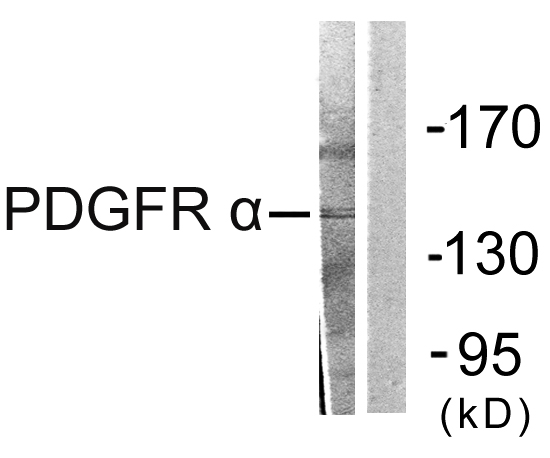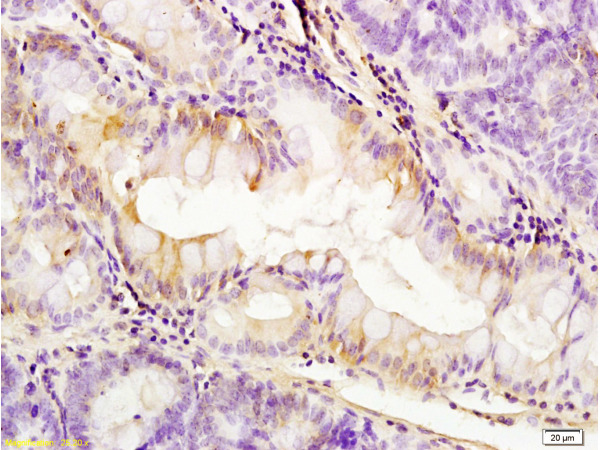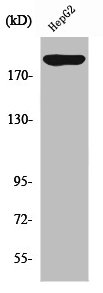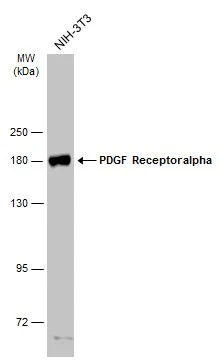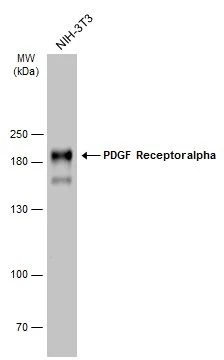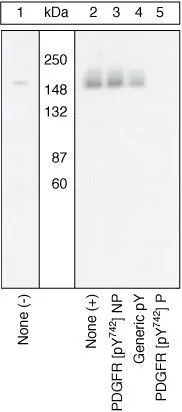
WB (peptide competition) analysis of NIH3T3 cells stimulated with PDGF (Lane 2-5) using GTX25452 PDGF Receptor alpha (phospho Tyr742) antibody prior incubated with the non-phosphopeptide corresponding to the immunogen (Lane 3), a generic phosphotyrosine containing peptide (Lane 4), or, the phosphopeptide immunogen (Lane 5) control. The data show that only the immunogen phosphopeptide blocks the signal, demonstrating the specificity of the antibody.
PDGF Receptor alpha (phospho Tyr742) antibody
GTX25452
ApplicationsWestern Blot, ImmunoHistoChemistry, ImmunoHistoChemistry Paraffin
Product group Antibodies
ReactivityHuman, Mouse
TargetPDGFRA
Overview
- SupplierGeneTex
- Product NamePDGF Receptor alpha (phospho Tyr742) antibody
- Delivery Days Customer9
- Application Supplier NoteWB: 0.35-1.0 microg/ml. *Optimal dilutions/concentrations should be determined by the researcher.Not tested in other applications.
- ApplicationsWestern Blot, ImmunoHistoChemistry, ImmunoHistoChemistry Paraffin
- CertificationResearch Use Only
- ClonalityPolyclonal
- ConjugateUnconjugated
- Gene ID5156
- Target namePDGFRA
- Target descriptionplatelet derived growth factor receptor alpha
- Target synonymsCD140A, PDGFR-2, PDGFR2, platelet-derived growth factor receptor alpha, CD140 antigen-like family member A, CD140a antigen, PDGF-R-alpha, alpha-type platelet-derived growth factor receptor, platelet-derived growth factor receptor 2, platelet-derived growth factor receptor, alpha polypeptide
- HostRabbit
- IsotypeIgG
- Protein IDP16234
- Protein NamePlatelet-derived growth factor receptor alpha
- Scientific DescriptionThis gene encodes a cell surface tyrosine kinase receptor for members of the platelet-derived growth factor family. These growth factors are mitogens for cells of mesenchymal origin. The identity of the growth factor bound to a receptor monomer determines whether the functional receptor is a homodimer or a heterodimer, composed of both platelet-derived growth factor receptor alpha and beta polypeptides. Studies suggest that this gene plays a role in organ development, wound healing, and tumor progression. Mutations in this gene have been associated with idiopathic hypereosinophilic syndrome, somatic and familial gastrointestinal stromal tumors, and a variety of other cancers. [provided by RefSeq, Mar 2012]
- ReactivityHuman, Mouse
- Storage Instruction-20°C or -80°C,2°C to 8°C
- UNSPSC41116161

